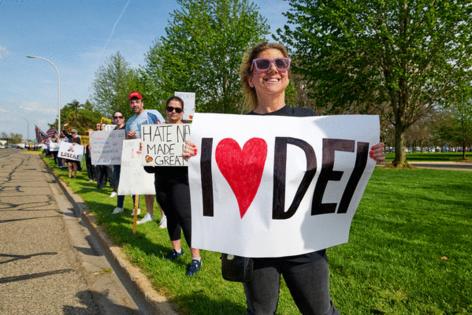Commentary: Stand up for diversity in science
Published in Op Eds
Besides spurring nationwide protests over police brutality, the 2020 murder of George Floyd in Minneapolis also prompted a larger reckoning that included universities and scientists who contended with the histories and modern realities of racism across their fields.
The scientific community seemed to finally be confronting something we Black scientists and other scientists of color have been saying for decades — that science has failed to include, and therefore to serve, everyone.
Researchers acknowledged ways that scientific institutions have not met their ostensible goal of benefiting all humans equally, and have instead historically supported pseudo-scientific claims about innate biological differences between races to promote the superiority of white people.
These historical claims lead to inequities in medicine. For example, sickle cell disease, whose patients are 90% Black, receives about one-tenth of the research funding per patient as cystic fibrosis, which affects 90% white people, even though sickle cell affects three times as many Americans as cystic fibrosis. Black and other minorities are also notably underrepresented in human genomic studies worldwide, with African ancestry patients making up a mere 1.1% of all samples.
The racial reckoning of 2020 inspired many of the diversity, equity and inclusion (DEI) programs and statements across universities and research organizations that are now being walked back in response to attacks by the current administration.
The mounting existential threat to science has scientists of all backgrounds afraid. While some are speaking up about the importance of science, others are staying silent, and still others are fleeing abroad to more welcoming political climates.
The current administration is not attacking all science equally. Certain areas — including climate science, vaccine research and anything remotely connected to DEI— are taking a disproportionate hit. These are not random choices, but rather targeted efforts to dismantle any knowledge production that challenges a world order dominated by capitalism, colonialism, white supremacy and social inequities.
And of course, an administration that is financially supported by the fossil fuel industry wants to defund climate science — especially as research increasingly highlights the outsize effects of climate change on global communities of color. Of course, an administration that refuses moral culpability for historical racism and other inequities would reject DEI-adjacent science, even as cuts hurt the poor, rural, white communities they claim to support.
While it may be tempting to wait until the tide turns once more and science is again safe, I propose a different course of action: If scientists truly want our work to serve the whole of humanity, then it is our duty to engage with political realities beyond the immediate threat to our livelihoods.
If we truly believe that science must be by and for everyone, now is the time to recognize the interconnectedness of these struggles and fight for the world we want our science to exist in. Now is the time to get political.
I don’t necessarily mean running for office (though the importance of work being done by organizations like 314 Action committed to getting progressive scientists elected cannot be overstated). What I and many other minority scientists want is for our peers and institutions to simply care — not just when it was easy and politically expedient in 2020, but now, when it is hard.
Now, more than ever, it is important to remember that diverse voices in science make science better, a principle that will surely be tested by the financial strains that science is being forced to endure. Universities, scientific research organizations and their donors must act to prevent these financial losses from disproportionately affecting crucial DEI programs.
Admissions and hiring committees must defend the importance of diversity in the name of good science. Researchers must continue pushing for biologically and socially diverse study populations and engaging with minority communities to address past harms. Scientific journals must double down on their commitment to publishing work that addresses diversity, as Nature did this May in its editorial on ending racism in science.
I hope my fellow scientists will take these actions, not just to protect our own livelihoods, but to preserve the wellness of our society. America’s beautifully diverse tapestry deserves science that includes and serves everyone — for the good of science and for the good of us all.
_____
Tania Fabo is an MD-PhD candidate in genetics at Stanford University, a leader in its MSTP BOOST pipeline program, a Rhodes Scholar, a Knight-Hennessy Scholar, a Paul and Daisy Soros Fellow, and a Public Voices Fellow of The OpEd Project. She is the program leader for Stanford's MSTP BOOST pipeline program. This column was produced for Progressive Perspectives, a project of The Progressive magazine, and distributed by Tribune News Service.
_____
©2025 Tribune Content Agency, LLC.
























































Comments